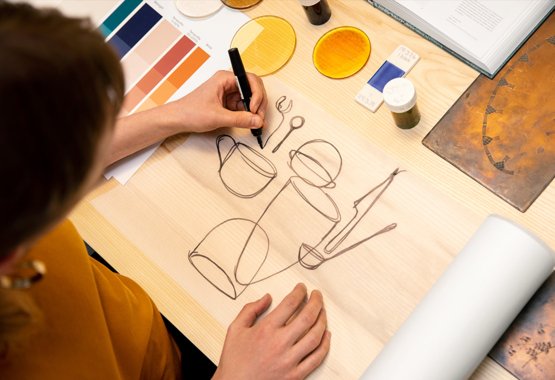
Premium design for better living
Our tools are made to last – to spark joy in and around the home for decades. We aim ensure our products stay in circulation for generations, even for good.

We are proud of the quality of our products and many of our products have extended commercial warranty up to 25 years.

We use new innovative materials, modular design and spare parts to extend the products’ lifetime.

All our products are carefully tested to fulfill Fiskars’ quality promise. For example, our Classic scissors are hand-tested at the factory, and our gardening products have stress tests to ensure they last in harsh weather conditions.

All our own manufacturing units and distribution centers are certified by the quality management standard ISO 9001.

The Fiskars Pan Care service restores the original, best features of worn-out frying pans. The service is available in Finland, and we explore the expansion potential of the service.

We offer various maintenance products, such as axe, knife & scissors sharpeners, that extend the product’s life.

We offer spare parts for many gardening tools and plan to expand the spare part offering.
We use recycled materials, and test renewable and bio-based options to replace fossil-based materials in our products.
- Our target is that by 2030, 50% of our gardening net sales will come from circular products.
- In Cooking & Creating, our target is that 47% of our net sales come from circular products in 2026.

In our cookware, we use widely 90% recycled stainless steel and 100% recycled aluminium.

In our Gardening products, we’ve increased the use of recycled raw material for plastic components. Examples include the Solid Planters, which are made with 65% recycled plastic.

Billnäs produced axes consist of >95 % recycled steel.

We use FSC certified (FSC C108780) wood in our cooking knives, kitchen utensils, cutting boards and axes. We do continuous plastics optimization to reduce CO2 emissions.
We reinvent the packaging of our products and the materials we use.
- We are improving our packaging across product series and prioritize the use of renewable and recyclable packaging materials.
- In most countries, our packaging can be deposited for recycling at cardboard or plastic collection points.
- We design the packaging for efficient pallet loading to reduce transportation emissions.

We design our processes to optimize material use and minimize waste.
- We plan to have zero landfill waste by 2030.

We recycle waste and excess material in our manufacturing units. We have closed systems in our factories for processing water.

We use modular product platforms, where the same components are used across multiple product variants, reducing the need for unique parts & minimizing material waste during production.

Our manufacturing unit at Sorsakoski, Finland, changed the steel surface treatment from polishing to brushing. The switch reduced the factory’s landfill waste by 30% in 2023 compared to the previous year. The change will be implemented gradually and as a result, the Sorsakoski manufacturing unit will reach zero waste to landfill in 2025.

Our main ways to decrease negative impacts on biodiversity are related to our efforts to support the circular economy, such as sourcing materials carefully and ensuring our products stay in circulation for as long as possible.

Our gardening tips encourage people to increase biodiversity in their gardens. We plan to expand the educational content in the future.

All cookware products will be PFAS-free by 2025 (read more here), and gardening products by 2026.
Fiskars Group’s sustainability targets and commitments
Fiskars Group’s two commitments, pioneering design against throwaway culture and making the everyday extraordinary, guide all Group level decisions. Fiskars Group monitors the progress frequently at all levels of the company.



